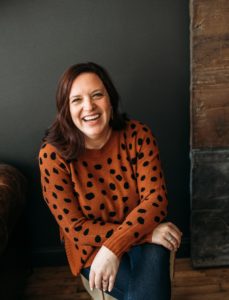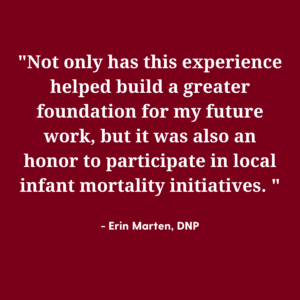#UMNMCH student Erin Marten (she/her) wrote this reflection on how her coursework, internships, and field/applied experiences have contributed to her career in MCH.
Background
I came to the MCH Program here at the U with an already established career as a nurse-midwife, but with a driving desire to understand my patients and their experiences on a more comprehensive systems level. As a practicing midwife, I have often been frustrated by trying to help my patients navigate a system that was just not made to help them. In many cases, it continues to put them at significant risk of morbidity and mortality. I couldn’t help but feel that there is a better way to care for people’s health and wellness. Even as far back as nursing school, I have had a passion for community health, and I think I always knew that a Master’s in Public Health was needed to round out my education and provider skill set. Shortly after I started attending online classes at the University of Minnesota, I took a leap of faith and left my practice as a midwife to create a non-profit sexual and reproductive health, wellness, and justice organization in my hometown of Toledo, Ohio, called Solace Health and Wellness.
Solace Health and Wellness
Designed to integrate concepts of the wraparound approach (originally created for youth with severe mental health needs), patient-centered medical homes, and the Social-Ecological Framework for health and health promotion, Solace Health and Wellness has a mission to strengthen the health of the community through inclusive and culturally appropriate sexual and reproductive healthcare and mental health services, a variety of relevant educational opportunities, comprehensive social and personal support, and advocacy on behalf of the community.

When I was in practice as a nurse-midwife, I cared for a 50/50 blend of private and publicly insured patients and patients that represented a wide variety of educational and economic backgrounds. I have seen firsthand systemic racism and both implicit and explicit biases at play in real-time. As a direct health care provider with a public health background, it is important to me to ensure that my team and I create a space where all patients feel seen, heard, and respected. We are doing this by ensuring that our leadership team and staff are reflective of the communities we serve and that everyone who works or volunteers at Solace shares in our commitment to provide culturally humble and person-centered care. We seek to prioritize extensive training in race, gender, sexuality, and in local DEI initiatives. We have also prioritized listening closely to our community and ensuring that our programming is addressing their needs and not ours.
The MCH program has helped me feel (mostly) confident by essentially guiding me through a process I am already in! I have felt well prepared to tackle all of the pieces of creating and launching our programming – from budgeting and grant writing to curriculum development and leadership. My professors at the U have been open, accommodating, and even excited when I have asked to integrate my professional work into my academic work and vice versa.
The Village Care Doula Program
I have also had the opportunity to lead a group of local doulas in creating a Doula-led prenatal care initiative for The Neighborhood Health Association, a local FQHC. With grant funding through the Ohio Department of Health, the team and I created a novel and proprietary prenatal care program that combines the expertise of certified nurse midwives and doulas to provide patient-centered care in both individual and group settings. All patients who travel through the program for their prenatal care benefit from extensive childbirth and parenting preparation in group settings as well as constant doula presence during labor and delivery. Our doulas are also trained to assist patients in navigating a health care system that potentially causes them fear and anxiety by educating them on informed consent and shared decision-making strategies.
This was my first experience navigating grant participation on a large scale, and the lessons I learned were immeasurable. Not only has this experience helped build a greater foundation for my future work, but it was also an honor to participate in local infant mortality initiatives. I have been able to network with local public health professionals and philanthropists in a way that I would never have been able to prior to this experience.
References
Winters, N. C., & Metz, W. P. (2009). The wraparound approach in systems of care. The Psychiatric clinics of North America, 32(1), 135–151. https://doi.org/10.1016/j.psc.2008.11.007
Jackson GL, Powers BJ, Chatterjee R, Bettger JP, Kemper AR, Hasselblad V, et al. Improving patient care. The patient-centered medical home. A systematic review. Ann Intern Med. 2013;158(3):169–78.
Bronfenbrenner, U. (1974). Developmental research, public policy, and the ecology of childhood. Child development, 45(1), 1-5.
McLeroy, K. R., Bibeau, D., Steckler, A., & Glanz, K. (1988). An ecological perspective on health promotion programs. Health Education Quarterly, 15(4), 351–377. https://doi.org/10.1177/109019818801500401
Erin is a part-time third-year MCH student. Her background is in nursing and midwifery. Erin received her bachelor’s in nursing from Lourdes University in Sylvania, Ohio, and her Master’s in Nurse Midwifery and Doctorate of Nursing Practice from Frontier Nursing University in Hyden, Kentucky. She is currently working on developing a non-profit sexual and reproductive health, wellness, and justice organization in Toledo, Ohio. In her spare time, she enjoys reading and spending time with her family. After graduating, she intends to continue her pursuit of integrating public health programming with direct health care delivery, deconstructing the status quo, and reimagining the way we deliver care to our communities.
–Read Student Spotlight archives
Interested in learning more about getting a degree in MCH? Visit our MCH Program page for more information.
#UMNMCH #UMNproud #UMNdriven
[Tags] Student Spotlight…

